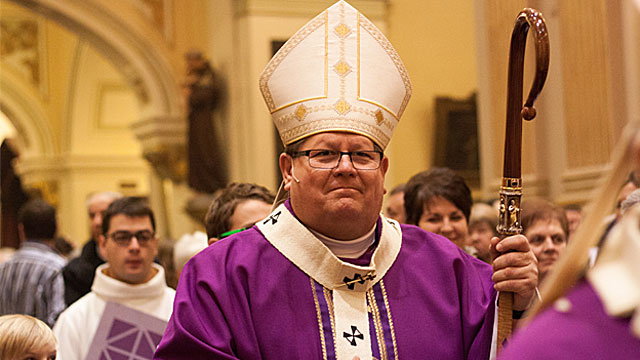

“Assistance in Dying”: No Deadline for Dignity
Salt + Light Media
Monday, May 30, 2016

The life you have received, the breath that sustains you, the personality that characterizes you are imprinted with beauty, nobility and greatness. The love you have received, the love you have given are always present and make you – like all of us – people that are vested with great dignity in all circumstances. What you have been, what you are today require, among other things, respect, accompaniment and appropriate care to help you grow to the very end.To respect the sanctity of life, the Catholic Church firmly opposes euthanasia and assisted suicide. She deplores that all the scenarios put forward by the federal government eventually allow a growing number of people to ask to end their life. Oftentimes, I repeat that the Church’s position is not to highlight the value of suffering. Yes, faith can give a sense to suffering, but Christians, just like Jesus, wish to avoid suffering when possible: “Father, if you are willing, remove this cup from me; yet, not my will but yours be done” (Luke 22:42). I am firmly convinced that God loves us with an eternal love, just as we are here and now, and until our death when he will receive us with open arms. Just listen to our emeritus Archbishop Maurice Couture’s recent conference on our diocesan web television ECDQ.tv to be convinced of it. Until next June 6th, I collectively challenge ourselves. You surely know a person who can recognize him or herself in the Québec and (soon to be) Canadian criteria for access to medical assistance in dying. Listen to that person express to the very end his or her suffering and fear. Tell that person that he or she has a great worth in your eyes and will always be able to count on your presence. Remind him or her of your unconditional love. The calls for assistance in dying usually disappear when suffering people are well accompanied. Doctors and palliative care personnel have so many times witnessed it to me. I thank them for pursuing their role in this new legislative context in Québec. Their efforts to relieve physical and moral suffering carry real fruits and investments in palliative care must continue. For those who oppose euthanasia – still a majority – , their objection of conscience must be protected. If a doctor does not wish to refer a patient to his medically provoked death, the doctor’s wish must be respected without being questioned. I also want to thank the caregivers. The present debate puts us at risk to forget their dedication, courage, strength, but also their sense of presence to others and their respect for life. These persons have a great need to be recognized and supported. My personal journey in accompanying people in end of life situations confirms to me that it is dangerous to allow permission to provoke the death of another person, even with his or her consent. Not only does the law dictate, but it educates and gives a demand of the right and a suggestion of duty. With time, customs are affected and the rarity of the gesture cedes way to habit. In my humble opinion, it is a very sad “progress”. We have the responsibility, the mission to accompany with gentleness and tenderness the life of our close ones who suffer, and that, without recourse to a law that promotes death. In this context, we are invited to prevent this suicidal mode by choosing to recognize the dignity of life. Written by Gérald C. Cardinal Lacroix Archbishop of Québec May 30, 2016
Related Articles:
Category: Faith Education, Featured
Tag: assisted suicide, Cardinal Lacroix, Catholic, euthanasia, Quebec, Supreme Court of Canada
Dominican Friars Youth Interfaith Video Contest 2025
Thursday, March 13, 2025
 Salt + Light Media
Salt + Light Media
The Office for Interreligious Dialogue and the Dominican Friars of Toronto invite students in grades 9-12 to participate in the 2025 Youth Interfaith Video Contest.
Visit local pilgrimage sites this Jubilee Year
Thursday, January 30, 2025
 Maria Montemayor
Maria Montemayor
For the Jubilee of Hope, there are designated local pilgrimage sites in every country, and Canada is no exception. How is a local pilgrimage site determined? The local bishop can designate any parish, shrine, or basilica in his territory as a Jubilee Year pilgrimage site.
Creating Catholic streetwear
Thursday, January 9, 2025
 Maria Montemayor
Maria Montemayor
Fashion and clothing designed to draw people closer to God can inspire and even sanctify others. Nate Nagello, the CEO and owner of the Toronto-based Sanctified Collective, hopes the clothing he creates can provide opportunities for conversation, engagement, and evangelization.
When do you pray the Rosary?
Wednesday, December 4, 2024
 Maria Montemayor
Maria Montemayor
The Rosary is powerful: many graces can be bestowed upon those who pray it, and it can also offer special protection. Reciting the Rosary aloud in church and praying for the pope’s intentions can grant the supplicant a plenary indulgence.
What does it mean to be pro-life?
Tuesday, October 29, 2024
 Maria Montemayor
Maria Montemayor
This month on Behold, we have a special Lives Lived for Life episode featuring the stories of various pro-life advocates and individuals.
SUPPORT LABEL
$50
$100
$150
$250
OTHER AMOUNT
DONATE










